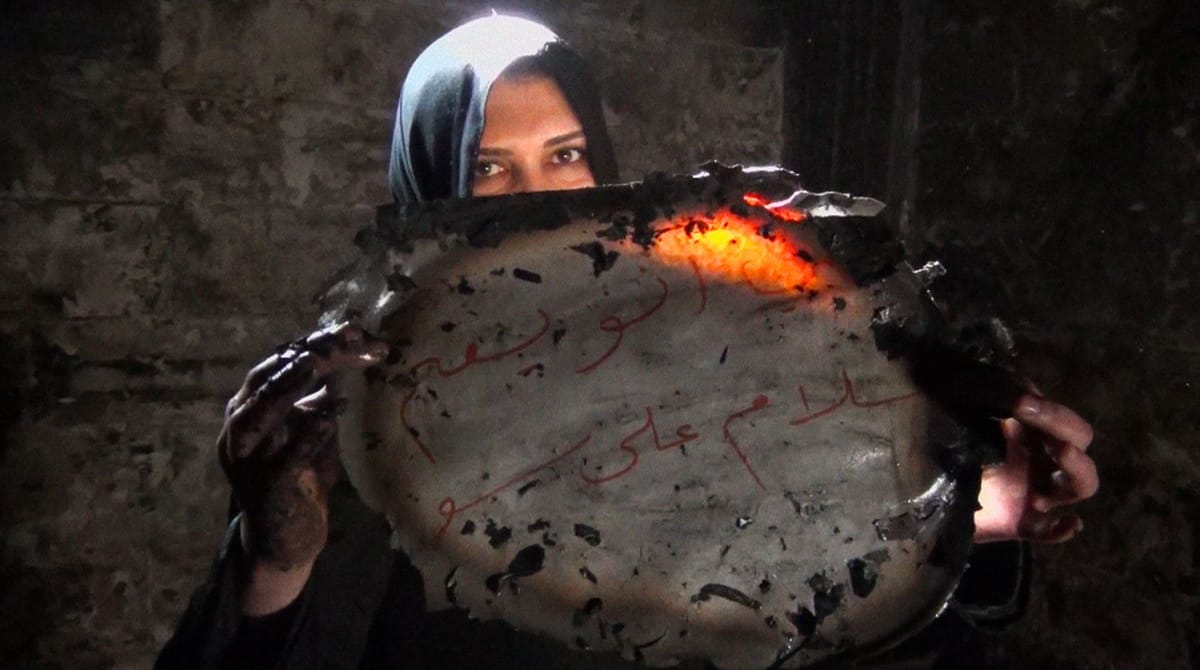Four Pledges: Syria’s Rebellious Women

Mel Plant, BA Arabic and Turkish
Zaina Erhaim, hailing from Idlib, Syria, has spent 9 years in the field of journalism, reporting largely in print and online news media. Once the revolution of her homeland turned to civil war, with each day casualties and displaces persons growing in their tens and hundreds, Erhaim decided that her journalism needed to become more active and visual in order to reflect the struggles of fellow Syrian women.
‘I wanted to document the work of women activists,’ said Erhaim, ‘for girls over 10 who are looking on Google for women working in the revolution’ as inspiration. Erhaim, now isolated from her home as an enemy of the regime and set to be stateless within a few months, has managed to succinctly capture the unique battles of Syrian women activists on the ground. In the mainstream media, the only women fighting in Syria who have been portrayed are the Kurdish YPJ fighters, too often fetishised. With Syria’s Rebellious Women, 4 deceptively short films, the director has shown how and why women carry out their struggle in Syria.
The first film, entitled ‘Promise,’ is the story of Waed, a citizen journalist from Aleppo who succeeded in convincing her family to allow her to move back to her home-city from their new home in southern Turkey in order to record events on camera. Waed states at the beginning of the film that ‘fear is a temporary feeling,’ and this sentiment fits well with those of the other women featured: the fear induced by barrel bombs is temporary, but the fear of returning to a Syria where everything has changed – or where the regime is still in power – is lasting.
The second film, entitled ‘Pledge,’ is the story of Ahed, a paramedic in Aleppo. Ahed jokingly sums herself up as 3 quarters guy and 1 quarter girl, but later goes on to say that despite the questioning stares of those she meets in her work, there is nothing more natural than to be a woman working in the revolution. The third portrait, entitled ‘Precious,’ is the story of Ghalia, an older community activist from Idlib who runs womens’ centres. Despite constant attack and threats against her for her work, she still says ‘every area of Syria is a piece of Heaven.’
Screened last was the most touching, a film entitled ‘Pretty,’ which depicts the life and work of a teacher and activist called Zein. Zein hails from Aleppo, now living and working in a rebel-held area, separated from her family who live in an area of the city held by ISIS. Zein was present at the Bertha DocHouse screening, part of a tour which will take the films to the US in small screenings – small, so as not to create too much public pressure on the women featured.
In the film, Zein reflects on her early revolutionary months protesting and then being put in detention, where she would write slogans on the cell walls for those who would follow in her place. Likewise, the walls of Waed’s room in the first film were also lovingly daubed with revolutionary graffiti – her way of re-constructing home in a city where she is now forced to dress in hijab. The films are full of these common threads, the most important being the feeling of disconnect that all of the women have experienced – exiting their old, pre-revolutionary or pre-detention or pre-Turkey, self and entering a new reality from which they doubt they will ever exit.
This screening was the first time Zein had seen the film about her. At first too emotional to speak, she later made sure to point out where exactly the fault for the ongoing war in Syria lies, harking back to all the women’s early days as protestors. Both Zein and Erhaim criticised the international community for backing Assad in earlier days and focus on ISIS as the main enemy in Syria, despite ‘96% of civilians being killed by regime forces.’ They attacked Russia for its air strikes, comparing them to a more technologically-equipped Assad. Zein, a school teacher, recounted how winter used to be a time of ‘luxury,’ with cloudy or rainy days being effective no-fly zones for the regime. With superior Russian technology, she says, Syrians have lost this luxury – all seasons are now the season of shelling, with life and work being forced underground.
Despite the ongoing hope of all the women activists depicted, the screening ended as all those on Syria do: with a sad reflection that, ‘I don’t see any light at the end of the tunnel.’ Erhaim spoke of her jealousy of international journalists who could easily roam the streets of Damascus, those which ‘[she] really belongs to,’ while for her it is impossible to attain a new Syrian passport – ‘the country we would die for.’ Zein, too, reflected that there are only 2 options left for the future: topple the regime or die in Aleppo. It seems that Waed, Ahed and Ghalia would say the same thing.
Syria’s Rebellious Women will be screened at SOAS on 13th November at 5pm in the KLT, hosted by the London Middle East Institute.
The Bertha DocHouse runs screenings every week with student discounts. Syria’s Rebellious Women was featured in their twice-monthly DocHouse Thursdays series. With their FB45 offer, between Monday and Thursday ticket prices are £5 per screening.




